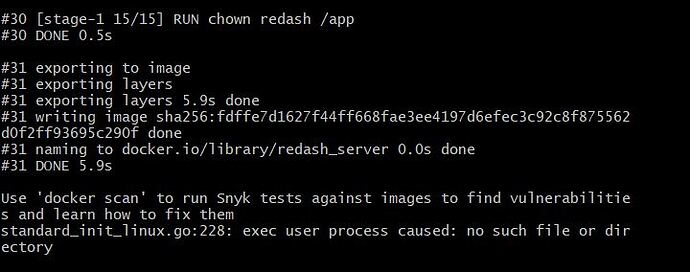Issue Summary
Hi…
ive been installing redash and always got this error, the redash server didnt run and cant access localhost:5000
here is my installation step:
- git clone GitHub - getredash/redash: Make Your Company Data Driven. Connect to any data source, easily visualize, dashboard and share your data.
- create .env and edit .yaml file
- docker-compose run --rm server create_db
- docker-compose up
this is the error after i run docker-compose run --rm server create_db
this is the error after i run docker-compose up
my .env file
PYTHONUNBUFFERED=0
REDASH_LOG_LEVEL=INFO
REDASH_REDIS_URL=redis://redis:6379/0
POSTGRES_PASSWORD=
REDASH_COOKIE_SECRET=redash-selfhosted
REDASH_SECRET_KEY=redash-selfhosted
REDASH_DATABASE_URL=postgresql://postgres@postgres/postgres
docker-compose.yml file
# This configuration file is for the **development** setup.
# For a production example please refer to getredash/setup repository on GitHub.
version: "2.2"
x-redash-service:
&redash-service
build:
context: .
args:
skip_frontend_build: "true"
volumes:
- .:/app
env_file:
- .env
x-redash-environment:
&redash-environment
REDASH_LOG_LEVEL: "INFO"
REDASH_REDIS_URL: "redis://redis:6379/0"
REDASH_DATABASE_URL: "postgresql://postgres@postgres/postgres"
REDASH_RATELIMIT_ENABLED: "false"
REDASH_MAIL_DEFAULT_SENDER: "redash@example.com"
REDASH_MAIL_SERVER: "email"
REDASH_ENFORCE_CSRF: "true"
# Set secret keys in the .env file
services:
server:
<<: *redash-service
command: dev_server
depends_on:
- postgres
- redis
ports:
- "5000:5000"
environment:
<<: *redash-environment
PYTHONUNBUFFERED: 0
scheduler:
<<: *redash-service
command: dev_scheduler
depends_on:
- server
environment:
<<: *redash-environment
worker:
<<: *redash-service
command: dev_worker
depends_on:
- server
environment:
<<: *redash-environment
PYTHONUNBUFFERED: 0
redis:
image: redis:3-alpine
restart: always
postgres:
image: postgres:9.5-alpine
# The following turns the DB into less durable, but gains significant performance improvements for the tests run (x3
# improvement on my personal machine). We should consider moving this into a dedicated Docker Compose configuration for
# tests.
ports:
- "15432:5432"
command: "postgres -c fsync=off -c full_page_writes=off -c synchronous_commit=OFF"
restart: always
environment:
POSTGRES_HOST_AUTH_METHOD: "trust"
nginx:
image: redash/nginx:latest
ports:
- "80:80"
depends_on:
- server
links:
- server:redash
restart: always
im wondering there is a mistake in my .env and .yml file, but i really dont have any idea bcs i have tried several different files and still didnt success…
really need help for this…
Thank You
Technical details:
- Redash Version: v10.1.0
- Browser/OS: firefox/ Win 10
- How did you install Redash: https://redash.io/help/open-source/dev-guide/docker




